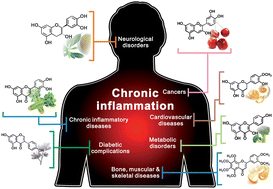Welcome to Monday folks! Hope you all had a wonderful weekend and are ready to dominate this week! After a recent discussion with a friend, I thought it would be good to address chronic inflammation and some dietary changes that may help eliminate the redness, swelling, and irritation associated.
 When you think of inflammation, you might think of acute inflammation such as spraining your ankle and the response of your immune system to trigger a chain of events called the inflammatory cascade. This is your immune system getting to work on the infection or injury at hand when the pro-inflammatory hormones seek help from your white blood cells to come clear the infection or damage tissue area. In addition, anti-inflammatory components start the healing process once the area has been evaluated and neutralized. This give and take illustrates a well-balanced immune system and is very important. However, when I refer to chronic inflammation, I am referring to a silent, long-term problem that can become serious.
When you think of inflammation, you might think of acute inflammation such as spraining your ankle and the response of your immune system to trigger a chain of events called the inflammatory cascade. This is your immune system getting to work on the infection or injury at hand when the pro-inflammatory hormones seek help from your white blood cells to come clear the infection or damage tissue area. In addition, anti-inflammatory components start the healing process once the area has been evaluated and neutralized. This give and take illustrates a well-balanced immune system and is very important. However, when I refer to chronic inflammation, I am referring to a silent, long-term problem that can become serious. Chronic inflammation leads your body to release compounds over extended periods to treat the redness, swelling, and irritation. This in turn causes your arteries to swell, you may feel depressed or anxious, your joints might ache and you may feel more fatigued because the chronic need can be exhaust your immune system. Additional symptoms include feeling bloated, skin problems, indigestion, and feel like your body is on fire from the inside out. The only sure way to tell if you are dealing with chronic inflammation is to have a blood test, checking for C-reactive protein markers that rise with inflammation.
The good news is that once you understand inflammation and what is causing it, you can take action to balance out your system and regain control of your body. A major component related to inflammatory issues starts with the diet and GI tract. The digestive tract is wired to jump into action in order to eliminate bacteria in your food before it can harm or infect your body, so it is not surprising that most of inflammatory issues begin in the GI tract or from the foods we are feeding our body.
There are certainly foods that cause inflammation as well as foods that help subdue inflammation. Foods that cause an inflammatory response include polyunsaturated fats such as corn oil, safflower and sunflower oil, peanut and soy oil because they contain anomega-6 fatty acid that the body must convert into another omega-6 fatty acid that has a pro-inflammatory makeup. Refined sugars or foods with high glycemic values cause insulin levels to raise dramatically, thus placing the immune system under distress. Hormone or pesticide treated foods such as milk, red meat, and chicken can cause inflammation in the body in addition to foods high in trans fats. A great starting place for inflammation elimination is to pay attention to your diet.
Foods that help with inflammation include organic grass-fed or free-range meats, switching to oat, almond, or rice milk and using coconut or olive oil. Foods high in omega-3 fatty acids such as chia seeds, walnuts, and almonds, any cold water fish such as wild salmon and incorporating spices such as ginger, turmeric and cinnamon. Vegetables such as squash, brussel sprouts, dark leafy greens and beets in addition to fresh berries, peaches and pears are all helpful in eliminating inflammation.
Take care of you by listening to what your body is saying. Try cleaning up your diet and see how you feel. Get out and move your body. Get enough sleep, drink lots of water, and eliminate stress.
An anti-inflammatory recipe that is easy to create and one of my go-to meals is pan seared Salmon. I like to top it with a couple orange slices and chopped walnuts. Yum!


No comments:
Post a Comment